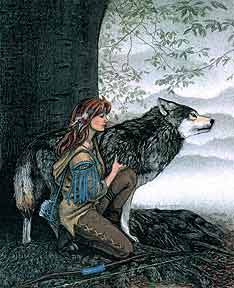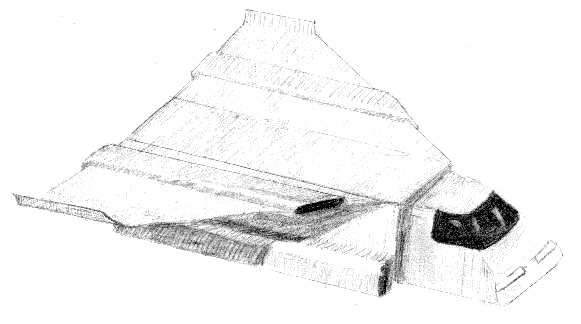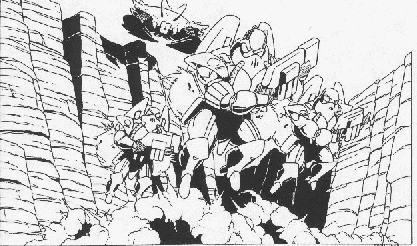 Chapter 8
Chapter 8  Chapter 8 Chapter 8 |
Initial Skills |
When you designed your character's background, you probably determined something about his childhood. Now you're going to use that background to determine what skills your character might have picked up during his childhood. This step reflects everything learned from birth to age 13 or so. You will have 60 DP to spend here.
 However, your character has not developed aptitudes yet. As a consequence, when you spend these DP (and only these), you should ignore your Aptitude Values. Instead, pretend all of your AVs are 4. Therefore, you will not use the Difficulties you calculated; instead, for this period only, you will simply use 4 plus the Diff Mod given in Chapter 7. Don't bother to write this temporary Diff down; you won't be using it again. However, if any Training values pass multiples of 25, the real Diff should go up as normal.
However, your character has not developed aptitudes yet. As a consequence, when you spend these DP (and only these), you should ignore your Aptitude Values. Instead, pretend all of your AVs are 4. Therefore, you will not use the Difficulties you calculated; instead, for this period only, you will simply use 4 plus the Diff Mod given in Chapter 7. Don't bother to write this temporary Diff down; you won't be using it again. However, if any Training values pass multiples of 25, the real Diff should go up as normal.
The first thing you'll want to learn is your native language. During childhood, your native language will be especially easy. Instead of using normal skill development, you use a special rule: for every DP you spend, your Training value goes up by 6 points. This only applies during childhood, and only to languages spoken regularly in your presence during your early childhood (usually up to the age of 3 or 4). After this period you still have a -2 Diff Mod to these languages (above any other modifiers).
Other skills you will learn will probably not reflect the character you will someday become. Your background will decide what skills you learn; particularly, your parents. The warrior-to-be is still learning his father's smithing trade; the woman who will someday win a Nobel prize in physics is learning soccer and violin.
Therefore, the sole determining factor in spending childhood DP is background. The GM will be very strict about enforcing this. If you feel you must train in swordplay or starship piloting in childhood, your background should include a very good explanation; furthermore, this explanation will probably have to be a significant part of your background, influencing many other factors.
 For instance, it's possible to make a character who learned Radiation Survival, Weapons: Laser Rifle, Backstabbing, and Demolition during childhood, perhaps in an extremely fierce post-holocaust world, raised amongst a tribe of desperate raiders who make a living by attacking and raiding the few operational dome-cities. Such a character might have killed before she was five, and lost half her family by time she was ten; she is also likely to have scars, physical handicaps, and weaknesses from her battles. More significantly, her personality and outlook on life will be extremely unusual. Such a character can be fascinating, but very difficult to play; be very sure you want to play such a character before you take one on.
For instance, it's possible to make a character who learned Radiation Survival, Weapons: Laser Rifle, Backstabbing, and Demolition during childhood, perhaps in an extremely fierce post-holocaust world, raised amongst a tribe of desperate raiders who make a living by attacking and raiding the few operational dome-cities. Such a character might have killed before she was five, and lost half her family by time she was ten; she is also likely to have scars, physical handicaps, and weaknesses from her battles. More significantly, her personality and outlook on life will be extremely unusual. Such a character can be fascinating, but very difficult to play; be very sure you want to play such a character before you take one on.
During the period from the ages of about 13 to 16, in most backgrounds, your character is still not learning the things she might have chosen to learn. Usually, much of this period is spent getting a good educational background.
You have 40 DP to spend. A majority will go to things your parents, teachers, or other mentors choose. However, a certain trend, towards things you are good at, is beginning to develop. Of course, it is not unlikely that parents will try to steer you stubbornly towards what they want you to do, not what you are actually good at.
 8.3 Apprenticeship
8.3 ApprenticeshipIn most backgrounds, it is at this point that your character begins to choose his own course of study. Depending on society, this begins at ages from 15 to 25 and runs until you are ready to set out and adventure. You have 50 DP to spend on the skills most adventurers consider "useful": weapons, engineering, high technology, or magic.
However, freedom is not complete yet. Other skills will be necessary, because later skills will build on them (e.g., Mathematics for Engineering). The would-be wizard must study the most meaningless cantrips, perform the most useless exercises, and practice the most uninteresting magics before being "graduated," all the while being told to have patience. The Space Marine will be required to study the sciences, mathematics, piloting, technical skills, engineering and construction, and a host of other fields, along with the weaponry and warcraft skills he really is interested in.
In some campaigns, characters may start at a skill level that is not the novice journeyman adventurer, but is an experienced character, a veteran of past adventures. Sometimes also, a character will join in later, but the GM wants that character to be at the same skill level as the other players' characters. There are three options the GM may choose for how to develop these skills.
 8.4.1 Full Development
8.4.1 Full DevelopmentThe most accurate method is also the simplest to learn, but the most time-consuming and tedious. Simply have the player do all the development you want to give. For example, if you want the character to have about 400 acquired DP, give him 250 DP (in five groups of 50, most likely) to spend (remember that he already has 150 DP from childhood, adolescence, and apprenticeship).
When using this method, it is important that you break the sum into pieces, which are about the same size as you usually give out at the end of adventures. Usually, breaking the points up into groups of 30-50 is appropriate.
Alternately, to save some time without compromising too much, you can figure out how many periods of how many points you would like to give the character, as in the above section, but then have the player only do a fraction of those periods, multiplying the results so that the net gain is the same as if he had done each period separately. For example, if you were going to give him 8 periods of 40 points, instead give him 2 periods of 40 points, and then multiply all Training gains by 4 before calculating SVs.
If you choose this option, you must make sure the player is careful to multiply only the increase, not the whole Training value. When adding this multiplied difference in, check to see how many cusps are crossed and make sure to increment the skill's Difficulty proportionally.
If it is not possible to divide the number of periods up so the player can multiply gains by a whole number (e.g., if your total is 7 periods) you can always do one or two periods the normal way, and then use this technique on the rest (e.g., 1 normal period, then 2 periods multiplied by 3). The more periods you actually train, the more accurate the result is, and the more in control of the process the player is, but more work is involved.
The simplest way, and the fastest, is to use the NPC Skill Chart and develop the character as if he/she was an NPC. The result is the Training value for the skill. Be sure to increment the skills' Difficulties depending on how many cusps were passed in total. Though very easy, this technique takes away much control from the player and tends to make more two-dimensional characters.